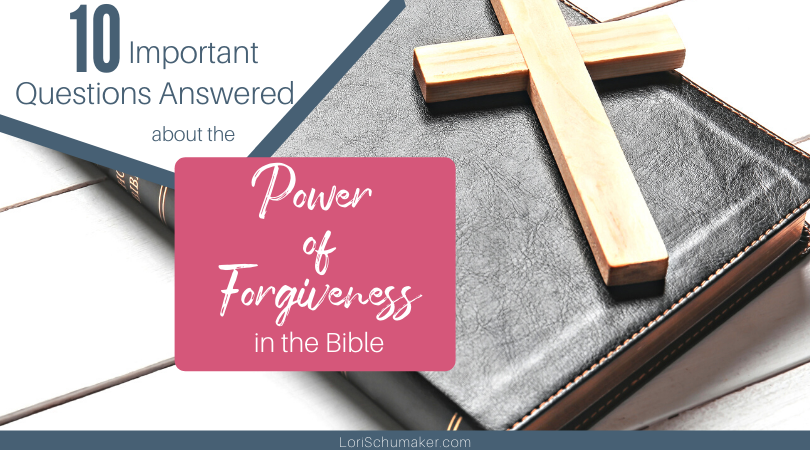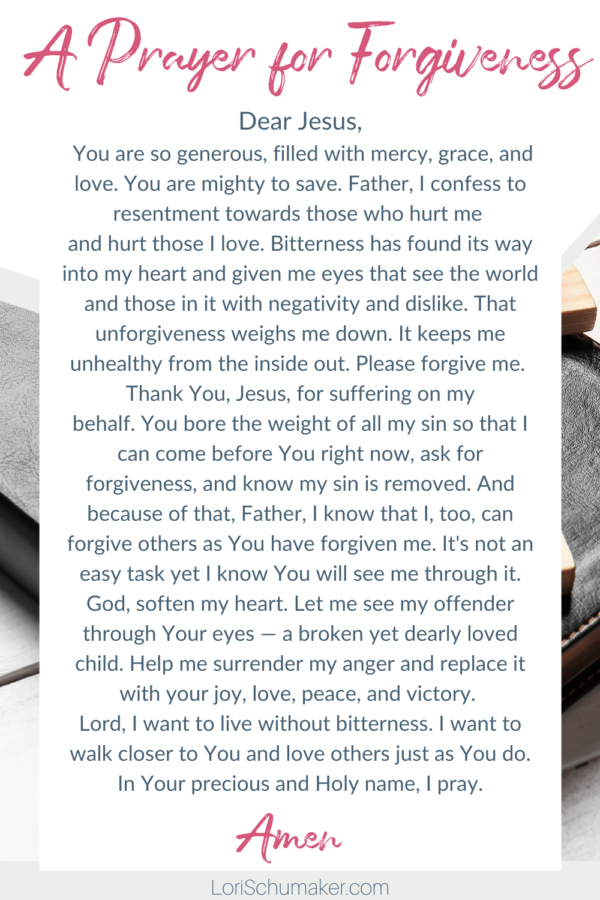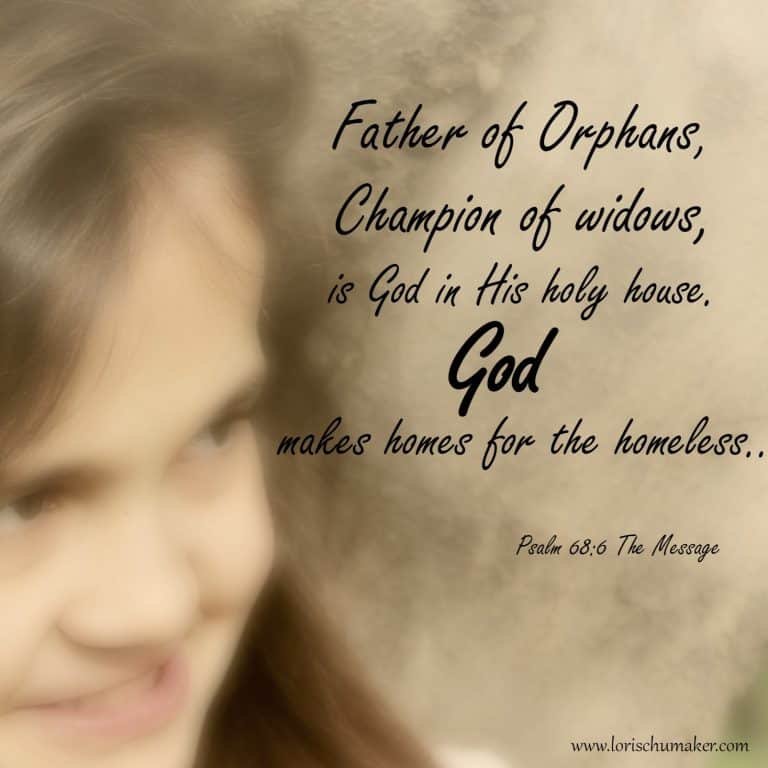10 Important Questions Answered About the Power of Forgiveness in the Bible
What is the power of forgiveness in the Bible all about? And why is forgiveness so important?
Forgiveness is an essential part of the Christian faith. It is a key component of the gospel message. The Bible teaches that God forgives sin and that we should forgive others. But finding the strength and courage to forgive ourselves or those who have wronged us can be difficult. However, understanding the Biblical meaning of forgiveness and the heart of God equips us with that strength and courage. It helps us to understand the importance of forgiveness and the power it has to experience the fullness of God’s love.
Welcome to Week 3 of What Does My Bible Say? Personal Answers to Your Big Bible Questions!

Why Is Forgiveness Important?
I remember a time in my life when forgiveness didn’t seem possible. Abuse, infidelity, and divorce can leave us jaded. My flesh wanted to follow what the movies showed and get revenge. Yet, my soul knew that wasn’t the answer. And besides, I was too worn out and weary to pursue it. I was a broken young woman who believed I’d done something wrong to deserve all of this. I believed Satan’s lies — the ones that told me there was something wrong with me and that I would never be enough.
It took me a long time to climb out of that pit. It took a relationship with Jesus and knowing the greatest love story ever written and found on the pages of my Bible. I learned why forgiveness is important and I learned about the power of forgiveness in the Bible.
Jesus is our courage and strength when we need to dig deep and forgive our offenders. He is the One who suffered and died on the cross so that we could live forgiven and have a place saved for us in Heaven. He did that out of His pure love for us … so there is no doubt He understands digging deep in the face of difficult circumstances.
When God with His merciful grace, forgives us, He removes our sins from us. Not just part of the sin, but He completely removes all of it from us. He demonstrates what our forgiveness on earth should look like. In the Lord’s prayer found in the book of Matthew, chapter 6, Jesus directs us to forgive others as we have been forgiven.
“Give us today the food we need, and forgive us our sins, as we have forgiven those who sin against us. And don’t let us yield to temptation, but rescue us from the evil one.” -Matthew 6:11-13
Then, when we tap into the strength and courage He provides and choose to forgive our offender, Jesus heals our tattered and broken hearts. That is the power of forgiveness in the Bible!
A power that sets us free of bitterness that wants to take root, eat away at our soul, and hold us back from being who we were fully meant to be. A power that will never come from revenge.
Two Components: God’s Forgiveness of Us and Our Forgiveness of Others
God’s Forgiveness of Us
Let’s start with the Old Testament.
Calach is the Hebrew word that means “to forgive”. It undergoes no changes and no other words throughout the Old Testament meaning “to forgive”. Also in the Old Testament, God is always the subject of forgiveness. From the beginning of time, God wanted His children to live with purpose and victory. But from the beginning, we were tempted by the enemy with things like want, desire, and control (to name just a few).
From Adam and Eve to the Israelites for whom He’d parted the Red Sea, to you and me right now, we are a disobedient and stubborn sort of people. But, again, because God wanted to see His children live with purpose and victory, He gave them a path to forgiveness. The path for the Old Testament believer was always assured of this forgiveness by sacrifice — by the shedding of blood. Without the blood, there was no forgiveness. It was a foreshadowing of Jesus and His ultimate sacrifice that would give us one-on-one access to Him and His forgiveness forever.
Fast forward to the New Testament. God sends His only Son so that we may have eternal life. He sent His Son so that sin would no longer separate us from God. He gave us a path to freedom. A path to living without the chains of shame and bitterness holding us back. No longer was there a need for a High Priest or for blood to shed. One-on-one became available 24/7.
God’s forgiveness of us means that when we, with a remorseful heart, apologize or ask for forgiveness, He unconditionally forgives us. He doesn’t hold it over our heads or bring it up later. Imagine a dry-erase board. The writing on it, our sin. When God forgives, He wipes that board clean. He doesn’t leave traces of it behind. He gives us a new starting point so we don’t drag our baggage around with us like a worn-out raggedy doll and an ever-growing load of suitcases.
Our Forgiveness of Others (Yes, that includes ourselves!)
Forgiveness means that with a sincere heart, we cancel our offender’s debt against us. It is a personal decision that necessitates surrendering our bitterness and rage in an act of trust in God. It’s letting the other person’s sin be between them and the God you trust to work all things together for your good (Romans 8:28).
God’s forgiveness which is written about time and time again in the Bible provides the motivation and model for our forgiveness. As Christians, our goal is to be more like Christ each day. We are imperfect and will never be like Christ. But it’s the direction in which we need to aim! God will equip us as we surrender in trust in Him. He will help us do what feels impossible.

10 Important Questions Answered About the Power of Forgiveness in the Bible
1. What does God’s forgiveness really mean?
God’s forgiveness is the complete removal of our sin from the canvas of our life. After God forgives us, He sees us as unblemished and blameless before Him.
“Yet now he has reconciled you to himself through the death of Christ in his physical body. As a result, he has brought you into his own presence, and you are holy and blameless as you stand before him without a single fault.” -Colossians 1:22 NLT
I spent a long time weighed down with shame and guilt. It propelled me into one poor choice after another and perpetuated a vicious cycle of pain. It wasn’t the secular self-help books or counselors that ushered in my full healing, either. But instead, it was learning that God was more than a far-away God who lived in Heaven and watched down in dismay at His people. Instead, I discovered He is a personal God who meets me one-on-one and desires a relationship with me. Then, as I began to build that relationship, I came to grasp the depth of His love for me and the grace He lavished, not because I deserved it, but simply because He is a loving God.
“You were dead because of your sins and because your sinful nature was not yet cut away. Then God made you alive with Christ, for he forgave all our sins.” -Colossians 2:13 NLT
God’s forgiveness means we can live free of fear, shame, or anything else that has the potential to hold us back from living out the purpose for which He created us. It means His grace can wash over our souls and renew our spirits. God’s forgiveness means there is a place set at His table just for us so that when we leave this life, we may have eternal life with Him.
“God showed how much he loved us by sending his one and only Son into the world so that we might have eternal life through him. This is real love—not that we loved God, but that he loved us and sent his Son as a sacrifice to take away our sins.” -1 John 4:9-10 NLT
2. Is there a limit to God’s forgiveness of us?
There is no limit to God’s forgiveness of us unless we are not apologizing from the heart. A truly repentant heart will always be forgiven. There is no sin too big for God’s grace to cover. There is nothing too ugly for God to forgive and then redeem.
This doesn’t mean God can be fooled. He knows the condition of our hearts at all times. When we repent for our sins, we must be convicted of the fact that 1) it was a sin and 2) we feel bad about it.
“The sacrifice you desire is a broken spirit.
You will not reject a broken and repentant heart, O God.” -Psalm 51:17
3. How do I forgive someone who has hurt me deeply?
Forgiving others is often very difficult. Especially when the hurt cuts deeply and changes our world forever. We sometimes hear of parents who extend forgiveness to their child’s murderer. Those stories show us the power of forgiveness because we see these people experience a release of bitterness that was eating away at their souls. We get a glimpse into the freedom that those who can forgive begin to live out once again. People who forgive go on to make the world a better place. They use their pain for good and often their forgiveness of the offender changes the offender’s life, as well.
“Would you like to see the Lord shatter the spiritual prisons in your life, the areas where you feel trapped? Then forgive those who put you there, for surely the walls of your imprisonment are made of your own anger and unforgiveness toward others.”
Francis Frangipane
When God’s children grasp the magnitude of how He has forgiven us, we tap into the courage and strength to forgive those who have sinned against us.
“If you forgive those who sin against you, your heavenly Father will forgive you. 15 But if you refuse to forgive others, your Father will not forgive your sins.” -Matthew 6:14-15 NLT
After my first marriage, I had a lot of healing to do. As I mentioned before, secular self-help and counseling only broke the surface of my shattered heart and soul. The person I had committed my life to loving, systematically tore down every trace of confidence in who I was or what I could do. Emotional abuse goes deeper than most ever realize. This man destroyed me mentally, physically, and emotionally.
But God.
He forgave us so that we, too, could forgive. So that the world would not be overrun by hate and so that the enemy would never win.
Forgiveness freed my soul. Pulling out the roots of bitterness untangled my confusion and pain. It allowed me to breathe again and it allowed me to begin the steps toward healing.
When God commands us to do something, we can know it is for our good. God doesn’t simply make rules for the sake of making rules. He knows what we need even when what He’s asking doesn’t feel like it’s what we need! Therefore, if God has asked us to forgive, we must forgive, or we go against God and His best for us.
“Let all bitterness and wrath and anger and clamor [perpetual animosity, resentment, strife, fault-finding] and slander be put away from you, along with every kind of malice [all spitefulness, verbal abuse, malevolence]. Be kind and helpful to one another, tender-hearted [compassionate, understanding], forgiving one another [readily and freely], just as God in Christ also forgave you.” -Ephesians 4:31-31 AMP
4. What if the one I’m angry at is God?
Sometimes we don’t even want to admit it. We want to be a good Christian so we refuse to face the thoughts and feelings we are dealing with about God. I’ve been there. I’ve wrestled with His version of justice more than a few times in my life. But what I have found is that God is a great big God. He knows what I’m thinking even when I don’t give voice to my thoughts and He knows what I am feeling when I have yet to discover it myself. He knows His children inside and out. As a matter of fact, He knows every hair on our head.
“And the very hairs on your head are all numbered. So don’t be afraid; you are more valuable to God than a whole flock of sparrows.” -Luke 12:7 NLT
So the first thing we must do is admit we have some bitterness toward God. Then, pray about it. Talk with God and He will soothe your soul. Dig into your Bible and find the Scriptures that tell us God’s character and His great love for you and me. Then pray some more, acknowledge the good He has done for you, and thank Him. These acts will help you understand that God did not cause the pain. We live in a broken and fallen world where sin runs rampant and causes sickness, disease, and disaster. God promised to walk you through it all, not to save you from the pain.
Release Bitterness Toward God
The second person we have to forgive, if we have bitterness, is God Himself. There are people who blame God because a child died, because a husband left, because they have been sick, because they have not had enough money. Consciously or unconsciously they think all of these things are God’s fault. There is deep-seated resentment. You cannot be resentful toward God and experience miracles. You have to rid yourself of any bitterness toward God. That may take some soul-searching. You must ask yourself, “Am I blaming God for my situation?”
cbn.com
5. Do I need to forgive someone who doesn’t ask for my forgiveness?
Yes. Lack of forgiveness blocks access to the kingdom and miracle power. In this instance, forgiveness is about us, our obedience to God, and our healing. Many years later my ex-husband did ask me to forgive him. But I had already done so long before. By the time he found me, I was remarried with two little boys. My healing had happened. But I believe that as I forgave, not only did my healing start but so did my ex-husband’s. I don’t know how he lives today. Yet, in my spirit, I believe God did a good work in him so that future generations would not suffer. That is the power of forgiveness in the Bible!
“Therefore, if you are offering your gift at the altar and there remember that your brother has something against you, leave your gift there in front of the altar. First go and be reconciled to your brother; then come and offer your gift” -Matthew 5:23-24
As the Roman soldiers and the Jewish citizens jeered at, mocked, and tortured Jesus, He chose to forgive them. They didn’t ask for forgiveness, Jesus offered it out of His abundant grace and mercy. In the face of such vileness, His courage to forgive stood above the ugliness. Satan would never win with Jesus.
“Jesus said, “Father, forgive them, for they don’t know what they are doing.” And the soldiers gambled for his clothes by throwing dice.” -Luke 23:34 NLT
6. Maybe God has forgiven me, but how do I forgive myself?
It took me a long while to forgive myself for the choices that I’d made. And I know I’m not alone in that feeling. I’ve listened over the years as many women have shared their stories of sentencing themselves into a forever prison of shame and guilt. I held myself within that same kind of prison even though I had full access to the key that would unlock the doors forever. That key was God’s grace. If I could accept His grace, I could forgive myself.
But God.
He gave me one moment where it all became too much. All my failure and rejection flooded over me, bringing me to my literal knees. The brokenness was so intense, I didn’t know if I had the strength or will to climb out of this pit of my own making.
But God
He gave me one friend who spoke bold truth and followed it by a plan of action.
But God
He arranged that very friend, along with a trusted professional, and a trusted environment. All the shame and all the pain that ravished my soul came pouring out in that space. Where two or more were present. What had been dark was now illuminated by His light where the enemy could no longer hide. I experienced the power of forgiveness in the Bible and victory was claimed on my behalf.
When I left that evening, everything didn’t turn “perfect”. It can’t because if there were a “perfect” we wouldn’t need Jesus.
But that night stopped the enemy’s vicious cycle of shame and guilt. Shame was replaced by His grace and truth. Rejection was given back to its rightful owners. I relinquished the condemnation I’d been holding over my head. I began the process of denying its power over my life.
It was a big step toward a deeper, fuller, relationship with Jesus. Today, the curtain of shame is gone. Just like everyone else, life gets hard. Hearts get broken. Relationships disappoint and hurt. But I’m not stuck cycling through shame, guilt, and condemnation.
The lure of the familiar is always there. Satan loves to tempt us with it. When I do something brave, the temptation to believe I’m not worthy of good is there. The enemy whispers and I may even entertain it for a second longer than I should.
But God. He taught me to speak His truth because it reigns over all other words.
So I speak declarations of God’s Truth:
I do not live to compare myself to another because then I will only be tossed into confusion (2 Cor 10:12) But instead, I strive to be an imitator of You, Lord, (1 Cor 11:1) seeking only Your approval (Galatians 1:10).
You call me wonderful and marvelous (Psalm 139:13-14).
I have no need for fear (2 Timothy 1:7).
If you have repented of your sin to God, He has forgiven you. That’s the power of Biblical forgiveness!
If He, the God of the Universe, can find it in Himself to forgive you, you can forgive yourself. He’s willing to make you white as snow. He treasures you and looks upon you with love and kindness. He asks you to do the same. So, go ahead, love yourself as God loves you, and let His grace wash over you.
Jessica Kastner wrote the paragraph below on CBN about forgiving yourself.
If God, who is sinless and without flaw, says we’re forgiven, we need to believe it. I think many of us are held back in our faith journeys, ministries, and even fail to fulfill our true destinies because we don’t really forgive ourselves for who we’ve been, or the things we’ve done in the past. The Bible says God holds no record of wrongs, yet how many times do those accusing thoughts pop into our minds reminding us of our failures and mistakes, in order to rob us of our joy and freedom.
Jessica kastner / CBN
There is nothing we could do to hinder God’s forgiveness, if we repent. God used Paul, a Christian-killing hypocrite, to write most of the New Testament. Kind David had murder and adultery in his list of sins, but was eventually called a “man after God’s own heart.” What’s important is Paul and David didn’t look back, once forgiven. Instead of schlepping through life never feeling adequate or worthy for their callings, they used the knowledge of who they were, and what God had forgiven them for, to embolden their messages and live in gratefulness. Now is the time to forgive yourself…for everything, and be joyful God sees you as new.
7. Where In the Bible Does It Tell Us That We Must Forgive Like He Did?
God tells us to forgive again and again in the Bible. This list is only a few of the many verses.
“If you forgive those who sin against you, your heavenly Father will forgive you. But if you refuse to forgive others, your Father will not forgive your sins.” -Matthew 6:14-15 NLT
“Instead, be kind to each other, tenderhearted, forgiving one another, just as God through Christ has forgiven you.” -Ephesians 4:32
“But when you are praying, first forgive anyone you are holding a grudge against, so that your Father in heaven will forgive your sins, too.” -Mark 11:25-26 NLT
“Then Peter came to him and asked, “Lord, how often should I forgive someone who sins against me? Seven times?” “No, not seven times,” Jesus replied, “but seventy times seven!” -Matthew 18:21-22 NLT
Pray like this: “Our Father in heaven,
may your name be kept holy.
Your Kingdom come soon.
May your will be done on earth,
as it is in heaven.
Give us today the food we need,
and forgive us our sins,
as we have forgiven those who sin against us.
And don’t let us yield to temptation,
but rescue us from the evil one.” -Matthew 6:9-13 NLT
8. Do I Need to Reconcile or Restore a Relationship to Really Forgive Someone?
Let’s talk about an important aspect of what forgiveness is not.
Forgiveness ≠reconciliation
To break it down further, reconciliation is not possible without forgiveness. However, forgiveness is possible without reconciliation. Reconciliation is the goal, but only achievable when both parties want it and are willing and authentic enough to do the work for it.
We forgive someone to free ourselves of the roots of bitterness. Sometimes that forgiveness results in the complete restoration of a relationship. Often it does not. Often it means the relationship will need new sets of boundaries. If we do not set boundaries, it usually means we enable behaviors. And if we enable behaviors, we risk getting in the way of the work only God can do within this person.
In Galatians 6:7 it says “Don’t be misled—you cannot mock the justice of God. You will always harvest what you plant.” When someone sins and we cover it up or sweep it under the rug, we are mocking the justice of God. As Christians or just very nice compassionate people, we confuse forgiveness with reconciliation. If a person does not stop the behavior once they apologize, setting a boundary with this person is the best option for you and them. They experience the natural consequence of their sin which is when the “aha” moments happen. It’s when the humbling happens and when eyes are opened in a new way to see God, allowing Him access to their broken heart.
So, even when setting a boundary feels “mean”, remember that often loving well means digging in and doing what is hard. After all, even Jesus set boundaries for those who wanted to do Him harm or those who were not willing to listen. He knew when He needed time with His Father and He knew when He needed time in solitude and rest. For more on this, read this great article at Soul Shepherding by Bill Gaultier about all the times and ways in which Jesus set boundaries.
9. Can I pray for a heart of forgiveness?
Yes. Yes. and YES! Praying brings us closer to God and therefore closer to the heart of God. His Word tells us that when we ask, we will be given. That’s a whole other complicated Bible topic, but the important part to know is that whatever is in God’s will is good to pray. Therefore, when we pray what we find in Scripture, we know we are praying God’s will. This prayer is a place for you to start. From there, take the Scriptures you have found in this post and pray them using your name or the name of a loved one inserted into the Bible verse. Here is an example of praying a Bible verse:
“8 God saved you by his grace when you believed. And you can’t take credit for this; it is a gift from God. 9 Salvation is not a reward for the good things we have done, so none of us can boast about it. 10 For we are God’s masterpiece. He has created us anew in Christ Jesus, so we can do the good things he planned for us long ago.” -Ephesians 2:8-10
The prayer would go something like this:
Dear Father, You saved me by Your grace when I believed. I can’t take credit for this because it is a gift from You. Salvation is not my reward for the good things I have done so I can’t boast about it. I am Your masterpiece! You have created me anew in Christ Jesus, so I can do the good things You planned for me long ago! Thank You, Lord, for this gift. Please guide me as I seek to do the good things You planned for me. In Jesus’ name, I pray. Amen
A Prayer for Accessing the Power of Forgiveness in the Bible: A Prayer for A Heart of Forgiveness
Below is a Scripture-based prayer for accessing the power of forgiveness in the Bible, or a heart of forgiveness. Although God listens to all our prayers, my formal go-to method is the ACTS Prayer Method.
Dear Jesus, You are so generous, filled with mercy, grace, and love. You are mighty to save. Father, I confess to resentment towards those who hurt me and hurt those I love. Bitterness has found its way into my heart and given me eyes that see the world and those in it with negativity and dislike. That unforgiveness weighs me down. It keeps me unhealthy from the inside out. Please forgive me.
Thank You, Jesus, for suffering on my behalf. You bore the weight of all my sin so that I can come before You right now, ask for forgiveness, and know my sin is removed. And because of that, Father, I know that I, too, can forgive others as You have forgiven me. It’s not an easy task yet I know You will see me through this. God, soften my heart. Let me see my offender through Your eyes — a broken yet dearly loved child. Help me surrender my anger and replace it with your joy, love, peace, and victory. Lord, I want to live without bitterness. I want to walk closer to You and love others just as You do. In Your precious and Holy Name, I pray. Amen.

10. Are there steps to Biblical forgiveness I can follow?
If you were to search “steps to forgiveness” you would find many options. I’ve seen as few as 3 steps and as many as 8 steps. They all cover the same general idea but the longer ones elaborate. I don’t feel that 3 steps sufficiently equips us. For me, 7 is the perfect number! After all, in the Bible God uses 7 to symbolize completion or perfection!
1. Make the Decision to Forgive
Forgiveness doesn’t just happen. It takes making intentional decisions and taking intentional actions. The first decision in any process is the decision to commit to doing whatever it is we want or need to do. So, to experience the power of forgiveness in the Bible we must decide it is time to forgive and that we are committing to the process.
If we aren’t emotionally ready to go there, we need to commit to an environment of healing. That means seeking help. Help is always available from God when we read our Bibles, worship Him, and spend time in prayer. We can read Biblical books that walk us through forgiveness and healing like the ones I share at the end of this post or talk to trusted mentors or friends who will lend a compassionate but truthful ear. Oftentimes, though, it is necessary to seek out a qualified counselor. EMDR, or Eye Movement Desensitization and Reprocessing, is a powerful tool qualified counselors now have to help us heal from trauma. EMDR has played a huge role in my healing. However, please make sure the counselor is well-trained and recommended.
2. Ask God for Help
Don’t try to go this alone. The impossible is only possible with Christ so be sure to include Him in every step. Keep focused on His Word and the truth we find in there. The enemy will fill our minds with lies as we step into the power of forgiveness. He doesn’t want us to experience that kind of freedom. He doesn’t like reconciliation. So be prepared to fight with the Word of God! In prayer, ask God to go before you. Ask Him to fight for you, reveal to you, and heal you each step of the way.
3. Think Through the Hurt
It is important to acknowledge the pain. We don’t want to get stuck there but we don’t want to simply bury it and expect it to never come out of hiding. Pain needs to be healed, not hidden. At that point, we can apply logic to the situation. By logic, I mean looking at the situation separate from our emotional reactions. Logic is more response than reaction. It gives us the ability to see what we may have missed or understand a perspective we couldn’t before. Because you’ve already asked for God’s help in this process, God may bring these things to mind for you. He may give you a Word of understanding or a glimpse into something more eternal than you’d thought of before.
4. Remember When God Forgave You
Remembrance is a powerful tool. Taking a walk down Memory Lane reminds us of what God has done before He will do again. It reminds us that if He was faithful to us before, He will be faithful again. And it reminds us that if He can forgive us for our many sins, we, too can forgive others because we have His power in us.
5. Let go of the Hurt and Give it to God
This is when we get to deal the death blow to Satan. We get to say, “This hurt no longer has the power to affect me because I am opening the fists I’ve tightly clenched around my unforgiveness and handing it over to God who heals all broken hearts.” And then we get to experience the freedom of a soul no longer weighed down by bitterness and we watch the enemy sulk away in defeat.
6. Pray for the Offender
When we can pray for our offenders, we know our heart is freed of the bitterness. Pray that God moves in their life. Pray that they open their heart to Him in new ways — ways that grow empathy, compassion, honesty, loyalty, kindness, and all the other wonderful things of God. Ask God to heal them of the brokenness in their lives and to replace everything ugly in them with everything beautiful that comes from God.
7. Forgive
Choose to say, “I forgive.” Maybe it is face-to-face, in a letter, or maybe it’s just between you and Jesus. If this person is someone dangerous or toxic, the words need only be shared with the Lord Himself. Whichever way, though, forgive and be freed from the weight of bitterness and let love in.
For another version of steps to help you in the forgiveness process, I’ve linked to my friends over at Crosswalk.
I know that letting go of bitterness and letting in love takes a lot of vulnerability. But it’s possible and it’s key to the power of forgiveness in the Bible. Loving and being loved is at the foundation of our deepest need. Without forgiveness, we can experience neither being fully loved nor loving fully.
This Post Is Part of a Series
“What Does My Bible Say: Personal Answers to Your Big Bible Questions” is a series covering questions about identity, forgiveness, fear, and prayer. To read the other posts in this series, simply click on the image.


Wait! Before You Go!
Living Surrendered on a day-to-day basis makes facing the hard days doable. When you live surrendered you trust God because you know Him and have witnessed what He’s done before. You know what He can do again. Whether it’s discovering the power of forgiveness in the Bible or just holding onto hope when everything is turned upside down in your world, living surrendered gives you all God’s strength, mercy, and hope.
You learn to live surrendered as you grow in faith. It comes with a relationship with Christ and that means knowing His Word and committing to worship and prayer. This website exists to help you along that road. I hope to encourage you and give you the tools you need to grow closer to Jesus so that you can live with an overflowing supply of grace, hope, and love.
Just fill out the form below to get access to the Library of Hope and all it has to offer as well as keeping you updated with any new and fun opportunities that can help you grow.






One Comment